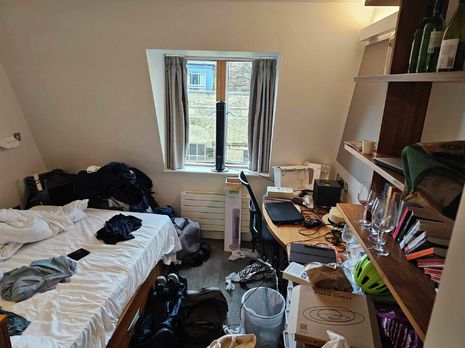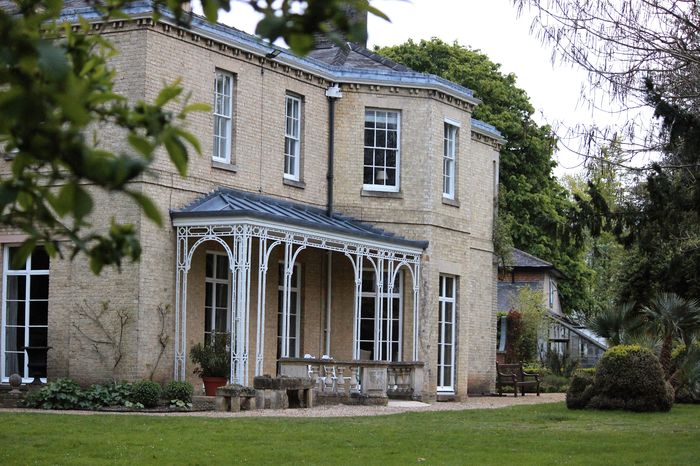Messy rooms or messed up priorities?
Lily O’Sullivan argues that the media’s coverage of the state of student’s rooms is another example of an unhealthy fixation on Cambridge students

Recently, the world of news has been shaken to its core by shocking accounts from Fitzwilliam College - that students have messy rooms. Writing for The Telegraph, William Sitwell, Old Etonian and heir presumptive to the Sitwell baronetcy, has chided these “filthy miscreants” for their shocking behaviour and suggested they learn how to “stack plates in a dishwasher”, a helpful suggestion when a working microwave is usually the highlight of college kitchen appliances. What’s more, housekeeping staff who faced a negative reaction after sharing images of the offending rooms via email are hailed as “heroes” in the piece which extols the “moral duty” of cleanliness which these students are so woefully lacking.
“Surely, therefore, we should all agree with Sitwell that the least we can do as “brainboxes” is keep our rooms in a respectable state?”
It is hardly newsworthy that the average student’s level of cleanliness and organisation leaves much to be desired, and photographic evidence of this rarely provokes national newspapers. It is difficult to imagine that the state of my friends’ student accommodation in Liverpool or Lincoln would warrant such a vociferous response, and neither would their occasional day drinking in a field, yet slot the word “Cambridge” in any headline and it will turn talking heads. Of course, the glaringly obvious feature of Cambridge life that provokes such a reaction, is the privilege that we all too often take for granted.
The inconvenience of my Thursday morning slumber being interrupted for my room to be cleaned by a housekeeper, leaving me to stumble, hungover, to seek refuge in a centuries-old dining hall in front of a cooked breakfast is a rather first world problem. Too many of us become concerningly accustomed to the luxuries of Cambridge life, overlooking the work of people such as housekeepers who keep our colleges and the University running.
Surely, therefore, we should all agree with Sitwell that the least we can do as “brainboxes” is keep our rooms in a respectable state? It’s no secret that a Cambridge degree comes with a demanding workload attached, and while the last thing most of us want to do after a long shift in the library is wash up last night’s dishes, it’s hardly a mammoth task. Whilst I agree many of us could do with a reminder to appreciate our surroundings more, I don’t think this is best done through the circulation of intrusive images, and certainly not outrage-filled columns in the press.
“Cambridge as an institution, and its student culture, is changing for the better, albeit at a punter’s pace.”
Cambridge’s image of elitism and grandeur, and therefore the supposition that we’re all over-privileged layabouts too busy reading The Iliad to clean up after ourselves, is hardly representative of the majority of our student body. It is, however, a useful trope; from Sitwell’s piece to Saltburn. Returning to my job at a restaurant during the holidays, I’m reminded of this stereotype from the presumption of my spoiled existence in boarding school-like bliss that leaves graduates (in the words of one colleague) “unable to wipe their own arses”.
While the behaviour of some students undoubtedly contributes to the often negative public perception of our university, I hope I won’t have to beg forgiveness for the occasional overlooked coffee mug in the creation of this stereotype. Cambridge as an institution, and its student culture, is changing for the better, albeit at a punter’s pace. But an obsession with Cambridge students living just like their counterparts elsewhere, does little to help with the over exaggeration of the ills of our supposedly hedonistic lives constructing an unfair image in public perceptions of the university.
With the passing of yet another typically scandalous C-Sunday (shock horror: students seen drinking in daylight!) this unfair media fixation on us no good, entitled idlers is unlikely to diminish anytime soon.
 Features / Are you more yourself at Cambridge or away from it? 27 January 2026
Features / Are you more yourself at Cambridge or away from it? 27 January 2026 Interviews / Lord Leggatt on becoming a Supreme Court Justice21 January 2026
Interviews / Lord Leggatt on becoming a Supreme Court Justice21 January 2026 News / Reform candidate retracts claim of being Cambridge alum 26 January 2026
News / Reform candidate retracts claim of being Cambridge alum 26 January 2026 News / Vigil held for tenth anniversary of PhD student’s death28 January 2026
News / Vigil held for tenth anniversary of PhD student’s death28 January 2026 News / Stand Up To Racism protests in solidarity with Minneapolis marches28 January 2026
News / Stand Up To Racism protests in solidarity with Minneapolis marches28 January 2026










